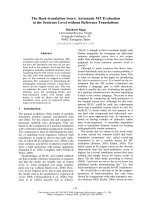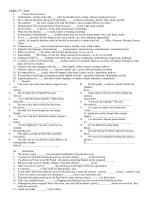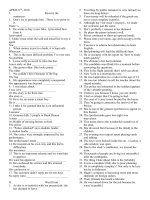The Sentence
Bạn đang xem bản rút gọn của tài liệu. Xem và tải ngay bản đầy đủ của tài liệu tại đây (77.62 KB, 4 trang )
The Sentence
Sentences are used in all languages. Sentences are used in both speech and writing. You
are learning about writing in English. When we talk about the sentence in this class, we
are talking about the written English sentence. We are not talking about sentences in
other languages. We are not talking about spoken sentences.
A. What is a sentence?
A written English sentence is a group of words with four characteristics:
1. All sentences begin with a capital letter: A, B, C,….
(The other kind of letters are called lower case: a, b, c,…. )
2. All sentences end with a period or an exclamation point or a question mark: . ! ?
3. A sentence contains at least one clause.
That is, a sentence contains at least one subject and at least one predicate.
4. All sentences follow a standard word order. These are correct sentences:
The dog bit the man.
The man bit the dog.
But this is not a sentence because the words (the same used in the two sentences above)
are not arranged in a standard English word order:
*The bit man dog the.
B. What is a clause?
A clause is a group of words that contains a subject and a predicate.
1. A clause tells us that someone or something (subject) is or was or does or did
something (predicate).
A subject is usually a noun or pronoun.
A predicate always contains a verb. A predicate may also contain other things (adverb,
object, complement,…), but a predicate always contains a verb.
2. A clause may be a sentence: Mary sings.
3. A clause may be a part of a sentence: Mary sings and Bill plays the guitar.
4. Some examples of clauses:
SUBJECT PREDICATE
Someone/Something is/was/does/did something.
George is a boy.
He loves to eat.
What he loves to eat is pizza.
George and his friends might have pizza for lunch.
Pizza is not served at George's house.
C. What is a predicate verb?
A predicate verb has the following three characteristics:
1. A predicate verb has a subject. A subject is usually a noun or a pronoun, but a clause
can be a subject.
2. A predicate verb has voice (active or passive; see Passive Sentences).
3. A predicate verb has tense (past or present; see Tenses) or a modal (see Modal
Auxiliaries).
These are the predicate verbs in the clauses above:
is (present tense, active voice)
loves (present tense, active voice)
is (present tense, active voice)
might have (modal, active voice)
is not served (present tense, passive voice)
D. What is a dependent clause?
A dependent clause is a group of words that contains a subject and predicate. A
dependent clause usually begins with a subordinator. Subordinators include relative
pronouns (see Adjective Clauses), subordinating conjunctions (see Adverb Clauses),
and noun clause markers (see Noun Clauses). Dependent clauses are also called
subordinate clauses.
1. A dependent clause cannot be a sentence by itself. A dependent clause that is not
part of a sentence is a fragment. That is, a dependent clause which begins with a capital
letter and ends with a period is a fragment. Don’t write fragments.
2. A dependent clause can only be part of a sentence. Every sentence must have at least
one independent clause.
3. There are three basic types of dependent clauses: adjective clauses, adverb clauses,
and noun clauses. Some dependent clauses look like this:
SUBORDINATOR + SUBJECT + PREDICATE
that his bike is beautiful
which he got for Christmas
because his bike had a flat tire
Other dependent clauses look like this :
SUBORDINATOR + PREDICATE
who loves his bike
whatever is on his plate
which is painted red and blue
The subordinator is also the subject in these clauses.
4. Subordinators can sometimes be omitted, so dependent clauses sometimes look like
independent clauses (Subject + Predicate).
Object relative pronouns (see Adjective Clauses) can usually be omitted.
The bike which he got for Christmas is beautiful.
The bike he got for Christmas is beautiful.
The noun clause marker (see Noun Clauses) that can be omitted if it is not the first
word in a sentence.
He knows that his bike is beautiful .
He knows his bike is beautiful.
5. Below are some examples of sentences with one independent clause and one
dependent clause. The dependent clauses are underlined.
George is a boy who loves his bike.
George’s bike, which is painted red and blue, is new.
Because his bike had a flat tire, George walked to school.
George eats whatever is on his plate.









